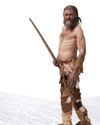
In ancient times, people used caves as shelters. When they moved, they often left things behind. Animals used caves for shelter, too, and left their bones inside when they died. Many of these remains were organic, such as wood tools and animal hides, and seldom lasted very long after time and weather destroyed or scattered them. Finding organic artifacts has always been a challenge for archaeologists and paleontologists.
About 12,000 years ago, warming temperatures melted much of the world’s glacier ice. Sea levels rose about 360 feet (110 m), and many caves were flooded. Cold, still water can preserve and protect organic materials in caves by keeping people and animals out. This water often has very little oxygen, so there are fewer living organisms and chemicals to damage cave contents. Without wind, waves or strong currents to move things around, underwater caves hold clues to how early humans lived. They’re just waiting for scientists to find them.
AN ICE AGE TIME CAPSULE
Most of the porous limestone caves beneath Mexico’s Yucatán Peninsula are filled with water. Divers have been working for many years to map them. In 2007, three divers—Alberto Nava, Alex Alvarez, and Franco Attolini—entered a huge underwater chamber, now named Hoyo Negro (“Black Hole”), and made a discovery that would change our understanding of ancient peoples in the Americas. “We discovered it somewhat by luck,” says Nava. “We were just exploring a tunnel and all of a sudden we came up into this big pit.” Hoyo Negro was more than 200 feet (62 m) wide and its floor was 150 feet (47 m) below sea level. It had been formed by the collapse of limestone where three underwater tunnels came together. The chamber contained the remains of large, now-extinct animals . . . and a human skull.
Bu hikaye Muse Science Magazine for Kids dergisinin January 2020 sayısından alınmıştır.
Start your 7-day Magzter GOLD free trial to access thousands of curated premium stories, and 9,000+ magazines and newspapers.
Already a subscriber ? Giriş Yap
Bu hikaye Muse Science Magazine for Kids dergisinin January 2020 sayısından alınmıştır.
Start your 7-day Magzter GOLD free trial to access thousands of curated premium stories, and 9,000+ magazines and newspapers.
Already a subscriber? Giriş Yap

A 12-Year-Old Girl's Election Sticker Is a Winner
VOTING IS A FUNDAMENTAL FREEDOM FOR AMERICANS, A MEANS OF DOING ONE'S CIVIC DUTY AND A WAY AN INDIVIDUAL CAN EXPRESS THEIR VOICE. In 1971, the United States lowered its voting age to 18. But that doesn't mean kids and teens under 18 can't participate in elections in various ways.

If everything the human brain does is basically sets of electrical impulses, how exactly does that translate into a state of mind?
You're not the only one asking this question. Every neuroscientist in the world is wondering the exact same thing, says Zach Mainen

EARTH'S TINIEST BUILDERS
THE HIDDEN WORLD OF MICROBES IN THE EARTH'S CRUST

MUMMIES SPEAK
ABOUT MICROBES, MIGRATION, AND MORE

GOING WITH YOUR GUT
HOW DO MICROBES AFFECT OUR HEALTH? LET'S COUNT THE WAYS...

BUG Detective
A burglar sneaks into a house on a quiet street in New York City. He walks through the house, touching countertops and door handles. Finally, he steals a single card from a full deck. Then he leaves.

Little Creatures Among Us THE MANY MICROBES IN OUR DAILY LIVES
When you think you're alone, you're actually not. In the ground, the air, your room, and even your body are Strillions and trillions of creatures so tiny you can't see them.

A Mars Rock Found With Leopard Spots Could Be a Sign of Ancient Life
IN JULY, NASA'S PERSEVERANCE ROVER CAME ACROSS A SPOTTED ROCK IN WHAT WAS ONCE A RIVERBED IN THE JEZERO CRATER ON MARS.

Para Athlete Uses Exoskeleton Suit to Carry the Olympic Torch
In July, a 36-year-old French tennis para athlete, Kevin Piette, got a chance to participate in this summer’s Olympic torch relay without using a wheelchair.

Ancient Egyptians May Have Used a Water System to Lift Stones to Build Pyramid
HOW ANCIENT EGYPTIANS BUILT THE MASSIVE PYRAMIDS IN EGYPT MORE THAN 4,000 YEARS AGO HAS LONG BEEN A TOPIC OF WONDER AND DEBATE.